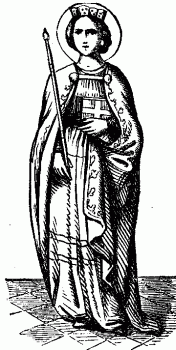Today, March 14, we celebrate the feast of Saint Mathilda (895-968), a woman of great royalty and privilege, who made it her daily mission to feed and serve the poor through generous charity and service. Saint Mathilda’s life demonstrates that while we all make mistakes, the Lord forgives, and brings us to Him in Christian perfection through penance and repentance. Saint Mathilda is the patron saint of disappointing children, large families, falsely accused persons, people ridiculed for their piety, queens, second marriages, and widows.
Born in Saxony, Mathilda was the daughter of Thierri, a prince of considerable importance. From an early age, Mathilda demonstrated great piety and love for the Lord, and was raised by her pious grandmother, Maud, the abbess of Enford, in the cloister. There, as she grew up, she practiced daily prayer and penance, and learned a love of labor and spiritual reading. Mathilda would have been more than content to spend her life dedicated to religious pursuits. However, her father arranged her marriage to Henry, the son of the Duke of Saxony. Within seven years, Henry found himself the King of Germany, and Mathilda, the queen.
King Henry demonstrated through his actions that he was a God-fearing and pious spouse. His equity and courage won him the respect of his subjects, and he encouraged and financed Mathilda’s longing to live a life of charitable service to others. While Henry ruled his kingdom, Mathilda devoted herself to penance, and spent her days visiting the poor and sick, offering them consolation and comfort. She also founded schools to provide education to all, visited incarcerated prisoners, and worked for the conversion of souls. Overall, her life was relatively a simple one, despite her royalty, with her primary focus on daily prayer.
After seventeen years, Henry died of apoplexy, and Mathilda, looking to the Lord, gave up her royal vestments and jewels, laying them on the alter of the Lord. Divesting herself of her title, she stepped aside for her children, with the eldest, Otho, becoming king. Henry became Duke of Bavaria, and the youngest, Bruno, the Archbishop of Cologne.
However, all was not smooth prior to the coronation, with Henry contesting his brother’s rightful place as heir. Mathilda, for her part, always partial to Henry, sided with him, her words creating significant discord between the brothers. Eventually, the brothers reconciled, but turned against their mother, stripping her of her dowry, and accusing her publicly of mismanaging the royal funds in service to her charities. Saint Mathilda accepted the punishment gracefully, recognizing her sinfulness in siding with one son above another, repenting, and offering herself wholly to the Lord in reparation.
The persecution and suffering of Mathilda was long and cruel, but she patiently bore this all, until her son reconciled with her. Her dowry restored, Mathilda was allowed to move back into the royal court. However, instead, she chose to live in the Benedictine monastery of Quedlinbourg, using her funds to serve the poor and extend the religious communities in the region dedicated to charity. She founded five monasteries, and built many churches.
Saint Mathilda grew ill, and realized that death was upon her. In the presence of her community at the monastery, she made a public confession, donned sackcloth, and covered herself with ashes. She further received last sacraments from William, Archbishop of Mayence, her nephew. Her body remains at Quedlinburg, where she is buried beside her husband. She is venerated there today.
The life of Saint Mathilda, like many of the saints we have read about during this first week of Lent, suggests to us that the love and forgiveness of the Lord are greater and more powerful than any sin we can commit, if we turn to Him with humble and contrite repentance. Saint Mathilda spent her days in penance and service to others, through her prayer, heartfelt repentance, and penance being washed clean of her sins and reaching Christian perfection in sainthood. How might we begin the process of repentance and conversion during this Lenten season? What sins of our own might we offer to the Lord with humble and contrite hearts?
Year 2: Day 73 of 365
Prayer Intentions: Humble and contrite hearts of repentance.
Requested Intentions: For successful outcome to surgery (C); Healing for brother (M); Successful employment (C); For the victims of the Japanese tsunami/earthquake (J); Healing (E); For a son struggling with depression (B); Successful conception (M); Freedom from social anxiety; confidence in the Lord (J); Improved success in employment and studies (D); Freedom from illness (T); For a wife’s employment (E); Healing of a husband’s knee (M); Freedom from sickness (R); Healing (C); Restoration of marriage (F); Freedom from medical difficulties, employment, successful relationship (D); End to suffering for sick brother; reconciliation of estranged family (E); End to husband’s addiction; Improved relationship; strength (M); Successful God-centered marriage; Sacramental life (M); Healing, successful relationship (S); For successful marriage (A); For a husband’s freedom from addiction (C); Freedom from pain and illness for a friend (M); Financial freedom (J); Successful passing of occupational examination (S); Healing and conversion, sale of house (L); Occupational success for employee and colleagues (J); Employment for a son (C); Successful attainment of an important appointed position (J); Recovery from cancer for a friend (Z); For a family’s freedom from sin (M); For a daughter with Diabetes (A); Healing of a father following stroke (S).








wow what an amazing story
ReplyDelete